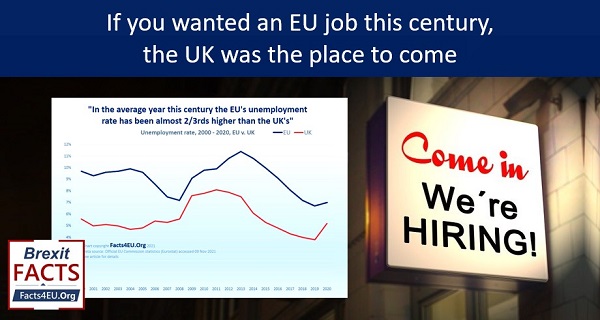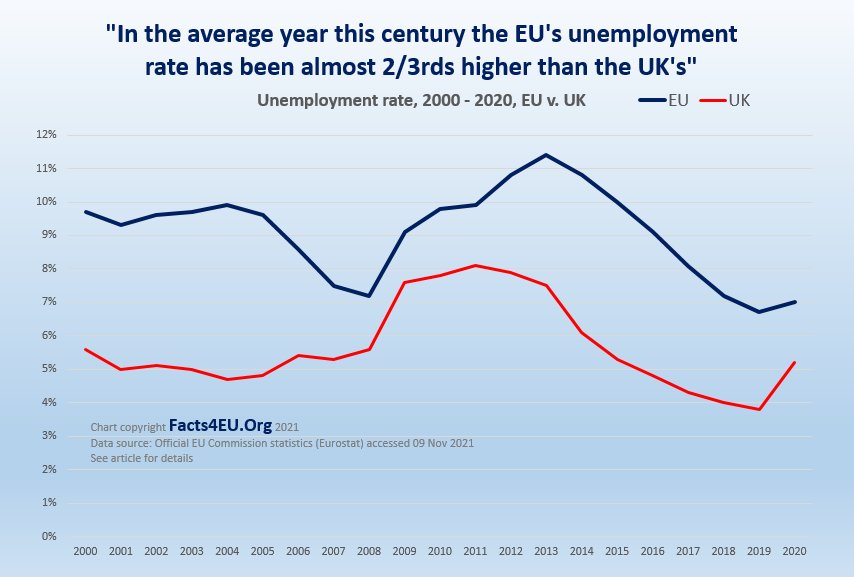EXCLUSIVE: If you wanted an EU job this century, the UK was the place to come
EU unemployment rate has been an average of 2/3rds higher than UK's in any given year

Montage © Facts4EU.Org 2021
Is it any wonder so many millions came from the EU27 to make their lives in the United Kingdom?
In an average year since the start of this century, the EU's unemployment rate has been an average of 2/3rds higher than the UK's in any given year, according to official EU figures researched by the Facts4EU.Org think tank and published today.
For every single year this century, unemployment in the EU has been higher in the EU than in the UK – and in some years it has been double the UK rate. These are comparable figures between the UK and the EU, contained in the EU’s own official statistics database.
Brexit Facts4EU.Org Summary
Unemployment rate, aged 16 and over, EU versus the United Kingdom, 2000 – 2020
In the average year this century, EU unemployment was 65.4% higher than the UK's
© Brexit Facts4EU.Org - click to enlarge
[Source data: Official EU Commission statistics from Eurostat. Note: The 2020 figure for the UK comes from the UK Office for National Statistics.]
In the EU Referendum year of 2016, the unemployment rate was 90% higher in the EU compared to the United Kingdom.
Providing permanent jobs for millions of EU citizens, and temporary jobs for millions more
The UK’s extraordinary record of consistently lower unemployment compared to the EU was achieved despite the UK receiving a large number of EU migrants during this period and providing jobs for millions of them.
The latest UK Home Office figures show that over 5.5 million (5,548,440) EU citizens have applied for permanent settlement in the UK since last year when the scheme became operational. Without this, the EU’s unemployment rate in recent years would have been even higher than it already was and is.
This figure of 5.5 million does not of course include the millions of EU citizens who came to the UK for jobs from 2000-2019, worked for some time, and who left before the Settlement Scheme started in 2020. In other words, the UK has effectively been mopping up part of the EU’s unemployment for decades. (See ‘Observations’ for our commentary on this.)
The worst 10 EU countries in which to be unemployed
The EU hasn’t solved unemployment in the last 20 years and is still way behind the UK. In some countries the problem continues to be severe. In particular, Greece, Spain, and the EU’s third-largest economy Italy all continue to suffer. President Macron's France also has much higher unemployment than the UK.
Brexit Facts4EU.Org Summary
The worst 10 EU countries for unemployment in 2020
- Greece: 16.3%
- Spain: 15.5%
- Italy: 9.2%
- Lithuania: 8.5%
- Sweden: 8.3%
- Latvia: 8.1%
- France: 8.0%
- Finland: 7.8%
- Cyprus: 7.6%
- Croatia: 7.5%
[Source data: Official EU Commission statistics from Eurostat.]
© Brexit Facts4EU.Org - click to enlarge
Observations
The effect on the United Kingdom of millions of EU migrants
The issue of the EU’s infamous ‘Freedom of Movement’ edict was an important reason amongst the many reasons why the majority of British people voted to leave the EU back in 2016. To this day there are Remain campaigners both inside and outside of Parliament who wish to continue Free Movement in some form.
To those EU citizens who already decided to make their homes in the United Kingdom, readers naturally wish to make them feel welcome. They arrived perfectly legally. That said, this should not prevent any discussion of the effects of such a dramatic population shift from the EU to the UK.
The UK absorbed over 5 million EU migrants – but at what cost?
Below are just some of the consequences of the EU’s policy of Free Movement, which allowed millions of EU citizens to enter the UK in recent years. These are all issues which have been raised by readers in correspondence with us over time, and the list is not exhaustive.
- Deflating wages, particularly low-paid people, because of plentiful cheap EU labour
- Pressure on housing – availability, rents
- Pressure on health services – no increase in doctors, hospitals, midwifery in areas worst affected
- Pressure on schools – class sizes, costs of employing translator-assistants in high immigrant areas
- The increased pressure on all local services
- Pressure on transport services and traffic
- Lack of training of British people, and EU immigrants with lower but supposedly comparable standards being recruited instead
- Lack of investment in new technologies and no increase in productivity, due to plentiful supply of cheap labour
- “It doesn’t feel like my town/village any more” – places with more EU shops than British ones, English not common language
One of the problems has been that when anyone tried to complain about any of the above, a common criticism was to describe them as in some way racist. The reality is that people have merely been pointing out what was simple common sense. Had more in the Westminster bubble actually left it and spent time in the rest of the UK, they might perhaps have been less surprised when the majority of the electorate voted Leave.
Of course, the Facts4EU.Org team are just uneducated and unintelligent, so what do we know....?
Do you want Facts4EU.Org to continue?
We are a 'not for profit' team (we make a loss) and any donation goes towards the actual work, not plush London offices, lunch or taxi expenses, or other luxuries of some organisations.
We badly need more of our thousands of readers to donate. Could this be you, today? Maybe you've been thinking about it, but just haven't got around to doing it? If so, let us reassure you. It's quick and easy and we use two highly secure payment providers. And we do NOT ask you for further donations if you donate once - we just hope that you keep supporting us. Your donation stays anonymous unless you tell us otherwise.
Please don't assume that other people will keep us going - we don't receive enough to survive and we need your help today. Could you help us?
Most of our readers are well-informed and appreciate our fact-based articles, presented in a way you won't see anywhere else. If you value reports like the one above, please help our work with a donation. We have far more to do in researching, publishing, campaigning and lobbying Parliament than we have in terms of the financial resources to fulfil these tasks. We badly need funding to continue - we rely 100% on public donations from readers like you.
If you believe in a fully-free, independent, and sovereign United Kingdom, please make a donation now. It’s quick, secure, and confidential, and you can use one of the links below or you can use our Donations page here. You will receive a personal, friendly ‘thank you’ from a member of our team within 24 hours. Thank you for reading this.
[ Sources: EU Commission | UK Office for National Statistics ] Politicians and journalists can contact us for details, as ever.
Brexit Facts4EU.Org, Tues 09 Nov 2021
Click here to go to our news headlines
Please scroll down to COMMENT on the above article.
And don't forget to actually post your message after you have previewed it!
Since before the EU Referendum, Brexit Facts4EU.Org
has been the most prolific researcher and publisher of Brexit facts in the world.
Supported by MPs, MEPs, & other groups, our work has impact.
We think facts matter. Please donate today, so that we can continue to ensure a clean Brexit is finally delivered.
Paypal Users Only - Choose amount first
Quick One-off
Monthly




Something to say about this? Scroll down for reader comments